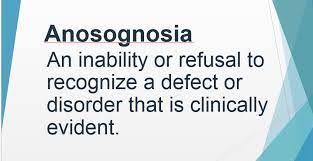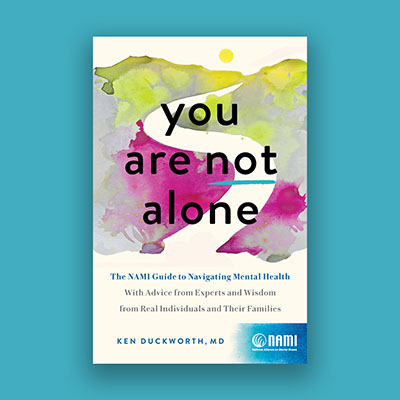
Anosognosia is discussed in book excerpt: YOU ARE NOT ALONE
(9-14-22) The National Alliance on Mental Illness is publishing its first book: YOU ARE NOT ALONE, written by its Chief Medical Officer Dr. Kenneth Duckworth. Dr. Duckworth has kindly allowed me to publish an excerpt discussing anosognosia – a lack of insight. The book goes on sale September 20. More information about You Are Not Alone and the national schedule of Dr. Duckworth’s appearances to discuss the book can be found at https://www.youarenotalonebook.org/.
YOU ARE NOT ALONE
A book by Kenneth Duckworth, M.D., published/copyright by NAMI. (Excerpt used with permission of NAMI.)
When someone is affected by a brain-based condition, it can be difficult to recognize or assess the extent to which their emotions and thoughts are affected by an illness process. My dad periodically experienced this state during his episodes, so I know intimately the challenge, pain, and helplessness it can generate for family members. The same microwave he truly thought was communicating to him during an episode of psychosis was just an appliance he used to heat up his coffee a few months later. We were lucky that his awareness would return once his episode ended, after months in the state hospital. He knew something had happened that prompted hospitalization, and he would take the prescribed lithium and antipsychotic medication, but he didn’t want to discuss his illness or treatment. He would rather take me to a Detroit Tigers game and engage in playful stories. It was also easier for me to take all the good in him and deny his painful episodes. 
That kind of denial on our part was a separate issue from that of anosognosia, which is inherent to the brain and not a conscious or unconscious choice. Dad happened to have both sides of this coin: episodic lack of awareness and self-protective denial after an episode. Anosognosia is the brain; denial is the mind. In fact, both of us had denial, but that can be worked on…. The brain dimension of anosognosia, however, is an ongoing challenge that science has yet to understand.
I asked two experts—Xavier Amador, author of I Am NotSick, I Don’t Need Help, and Kate Hardy, a leader in cognitive behavioral therapy for psychosis (CBTp)—to share their approaches to care in this critical area. Because anosognosia is brain-based, not everyone who lacks awareness of their illness can gain it—even with the best relationship support and treatment. I believe one way to better understand what your family member is going through is to listen to someone who has lost awareness, regained it, and can talk about it.
Anosognosia: Described As A Fog
Carlos A. Larrauri of Florida, a musician, nurse practitioner, and former NAMI board member who is also in graduate school, can describe the experiences of both knowing and not knowing. His close-knit Cuban American family was a strong force in helping him access early treatment and get the psychotherapy and medications that were helpful to him. Carlos described to me his experience with anosognosia, comparing it to a fog: There were moments early on where I had self-awareness. That’s the thing. The fog kind of rolls in. It doesn’t just settle all at once. At college I knew I should be doing my homework, but I was struggling to do it. I knew I should go to sleep, and I wasn’t sleepy. I’m feeling more anxious. “Psychotic break” is a misnomer. People think it just happens one day—just a sudden, clean break; you’ve had a traumatic experience. But it’s much more of an insidious process. There are periods of insight that occur. The fog waxes and wanes. My mom would say, “There were periods where I saw the real Carlos come back for a few days or hours. Then the psychosis would settle, and he would be inappropriate and not make sense.”
Carlos went on to explain: There’s this lack of awareness, but it’s punctuated with moments of insight that are absolutely terrifying. When you are fully aware that you’re losing your mind and everything that comes with it—your sense of identity, your sense of relation to the world around you, everything you love, the people, places—and you’re starting to get a sense of loss of all of that, it’s a terrifying experience.
For me, with medication came self-awareness, about two or three months later. It almost felt like a lightbulb went off. I had enough insight to realize, “Well, I need to take my meds, then, because now that I’m taking them, I have a home, I have food, I have shelter, I have my basic needs,” and I started to realize that I can’t meet any of those needs on my own. Carlos then used his awareness to leverage his many talents, becoming a national leader in advocacy, clinical care, and teaching in the mental health field.
Judy Harris and Norman Ornstein: The Loss Of Their Son
The experience of anosognosia can also be poignantly logical. Like every family confronted with this challenge, Judy Harris, a retired lawyer, and her husband, Norman Ornstein, a political scientist and emeritus scholar at the American Enterprise Institute in Washington, DC, struggled to understand their late son Matthew’s anosognosia. Judy recalled: Over time, we came to understand that our son had absolutely no insight into his illness. He was adamant that he was not sick. He believed to the core of his being that he had done something to anger God and that, as a result, God had taken his soul and was testing his faith. The only way forward was to earn back God’s love. Seeing a doctor and/or taking medicine would only anger God further and destroy any possibility of having his former happy, almost idyllic, life restored. The logical nature of anosognosia is challenging. The delusion, defined as a fixed false belief, isn’t reality based, but the conclusions still followed logically. Their son’s actions were completely rational if you believed what he believed.
After his death in an accident, Judy and Norm found solace in helping others. They founded the Matthew Harris Ornstein Memorial Foundation which supports Xavier Amador in providing low-cost trainings to first responders, medical professionals, and others in communicating better with people with severe mental illness; funds a summer debate institute and tournament, honoring Matthew’s enthusiasm and achievements as a champion debater; and underwrote production of the documentary film The Definition of Insanity, which highlights the work of Judge Steve Leifman in Miami-Dade County to decriminalize the treatment of people living with mental illness and help people with anosognosia get help and stay out of criminal justice settings.
Anita Herron Seeks Answers For Her Husband
How to cope with the loss and uncertainty that can accompany anosognosia is another common and difficult question families are forced to face. Anita Herron, was confronted with this challenge directly when she realized her husband was in a different stage than her in terms of processing their son’s lack of awareness: My husband has been at acceptance for a long time. He’s a praying man; and he reads his Bible and prays that he will survive this, until maybe one day our son will have the realization. I’m not as religious. For me, there’s a lot of guilt, even though you know you’ve done what you can. I finally came to terms with that probably a month ago. We were paying a lawyer for our son’s court cases, and our son never went to court. I finally said, “We’ve done all we could.” But there’s still always going to be that guilt. I used to get so angry when someone would say, “Well, Anita, you’ve done all you could for him.” I’d say, “Stop telling me that. There’s got to be something else I could have done.”
So even though in your mind you know you’ve done what you can, you still question.
ABOUT DR. KEN DUCKWORTH: Dr. Duckworth is Chief Medical Officer for NAMI, a position he has served in since 21003. He is a graduate of Temple University School of Medicine and trained at the Harvard University-Massachusetts Mental Health Center in adult, child and adolescent, and forensic psychiatry.

Dr. Ken Duckworth



